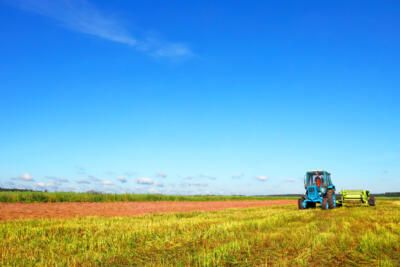A Call for Insights from Split and Non-Certified Operations
Gordon’s Policy Corner, September 2024
Our mission at OFRF is to “foster the improvement and widespread adoption of organic farming systems.” Organic certification has long been celebrated for its benefits to a variety of ecological and social systems; but we know that these benefits are not limited to fully certified organic farms. We understand that for a variety of reasons an operation will only have a portion of their land certified, or possibly forego certification entirely, but still operate as an organically-managed system. For those of you who manage operations like this, you have a unique perspective to observe and compare the impacts of organic practices across different types of land management systems.
We want to hear from producers like you about your relationship with and utilization of organic agriculture research. Research focused solely on conventional or chemical-based agriculture often cannot be applied to organic systems because it relies on inputs that are prohibited in organic farming. However, the opposite is not true: many organic practices can be beneficial for conventional farming operations as well. By understanding how split operations utilize organic principles, we can strengthen the case for increased funding in organic agriculture research that serves the entire agricultural community.

There are insights to gain from both split and non-certified organic operations about the benefits of organic.
Split Operations and the Potential of Organic Agricultural Systems
Split operations, where some fields are certified organic and others are managed using conventional chemistry- and genetic-based agricultural systems, provide an opportunity to offer valuable insights into the real-world application and benefits of organic farming practices and systems of management. This dual approach is a ripe opportunity for the observation of the effects of organic principles, such as cover cropping, complex crop rotations, reduced chemistry-dependance, and integrated pest management on their non-certified land.
We’re eager to hear your experiences and results from grasping this opportunity! The potential for healthier soils, increased resiliency of ecosystems, and even reduced input/fuel/labor costs is real.
Help Us Understand the Broader Impacts of Organic Research
Do you operate a split or non-certified operation that uses organic principles and systems? Do you know someone who does? We’re trying to hear from these operations to better understand how they might be using organic research in their decision making. Their experiences can help us better understand how organic agriculture research benefits the entire agricultural system, not just certified organic producers.
Quantitative analysis already shows that organic research benefits all of agriculture by developing methods that can improve soil health, enhance biodiversity, reduce input costs, and increase resilience against climate change. These benefits are not exclusive to certified organic farms—they are valuable to all farmers who are looking for sustainable, long-term solutions. Now we need your stories to make the qualitative points that illustrate these benefits!
Your Story Matters
Time and again, we hear in Washington that appropriators are hesitant to increase budgets for organic research programming because it is seen as too “niche” or doesn’t apply to all agricultural operations. If you or someone you know has a story to tell on this topic, it will be a crucial piece in helping us demonstrate the importance of organic agriculture research for the broader agricultural landscape.
Let’s work together to ensure that the benefits of organic agriculture are fully understood and leveraged for the good of all farming systems! Please reach out at gordon@ofrf.org.
Eat well and breathe deeply,
Gordon


